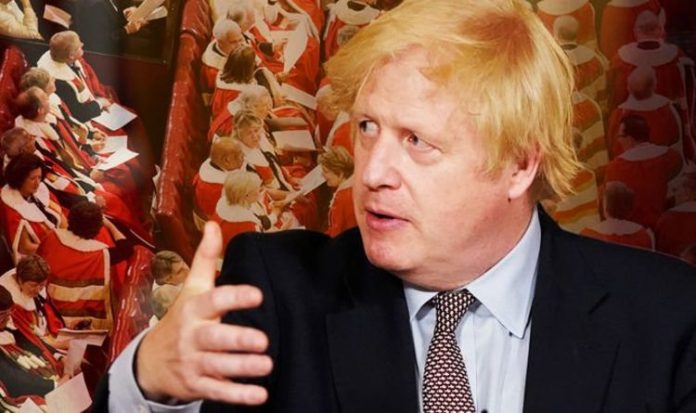In recent weeks, the House of Lords has been a subject of heated debate after Prime Minister Boris Johnson handed out 36 peerages to Conservative Party loyalists, Brexit supporters and even his own brother. The list of peerages, granted by the Queen last week – also included Evgeny Lebedev, Russian proprietor of the London Evening Standard newspaper and son of a former KGB agent, former cricketer Ian Botham and Ruth Davidson, former head of the Scottish Conservative Party. Ken Clarke and Philip Hammond – who fell out with Mr Johnson over Brexit and subsequently had the Tory whip withdrawn – were also given peerages. Seats in the upper chamber were also awarded to Claire Fox who represented the Brexit Party in Brussels as well as Labour rebels who had campaigned to leave the EU – Kate Hoey, Frank Field and Gisela Stuart. This has led many to question the role of the Lords – but diversity has also been a key criticism levelled at the upper chamber.
In March 2020, 48 or 6.1 percent of Members of the House of Lords were from ethnic minority groups, according to research by Operation Black Vote.
In February this year, it emerged that minority ethnic staff were asked to show their security passes more often than white counterparts.
This was found in a report which also outlined accounts from BAME staff who said they were not allowed to eat or drink in the same rooms or even use the same toilets as the mostly white members of the House of Lords.
The research carried out by workplace equality network ParliREACH listed “examples of times when they felt that the lack of diversity and understanding of race had resulted in racist (inadvertent or otherwise) behaviours”.
In response, a Lords spokesperson said: ‘‘The House of Lords administration is determined to ensure that all who work for the house are treated equally and with respect and creating an inclusive working environment.
“As part of this work, the board decided to remove access restrictions to catering facilities based on grade of staff, and remove misleading historic signage suggesting some toilets were restricted to members of the house.
“All signs have now been removed and replaced. This was part of our wider inclusion and diversity strategy.”
A petition calling for the abolition of the Lords gained over 100,000 signatures in 2018.
It took aim at the upper chamber as an undemocratic yet powerful overly influential fixture of British politics.
READ MORE: Jeremy Corbyn admitted NOT including state pension in tax return
The petition said: “The House of Lords is a place of patronage where unelected and unaccountable individuals hold a disproportionate amount of influence and power which can be used to frustrate the elected representatives of the people.”
The Electoral Reform Society chief executive – David Hughes – also hit out at the Lords after it was revealed in 2017 that more than 100 peers, who made no spoken contributions for a year, claimed £1.3million in expenses.
The ERS says: “The House of Lords totally fails to represent the diverse skills and experience of UK citizens.
“It is out of control – with over 800 members the second largest legislative chamber in the world after China.
“And it costs far too much for an institution that fails to reflect the British public.”
The House of Lords also played a crucial role in the Brexit process, frustrating eurosceptics with its decisions.
DON’T MISS
Corbyn humiliated as Labour peers chosen for ‘contribution’ to Boris [INSIGHT]
Petition to SCRAP unelected House of Lords exceeds 340k signatures [ANALYSIS]
‘£300-a-day undemocratic Brexit-blockers’ – but Boris wants MORE Lords [INSIGHT]
In September last year – peers supported a bill which prevented a no deal Brexit.
The Benn Bill mandated Boris Johnson to seek an extension to Brexit until at least January 31 if he could not secure a deal or gain MPs’ consent for no deal.
A spokesman for Number 10 said at the time: “The PM will not do this. It is clear the only action is to go back to the people and give them the opportunity to decide what they want: Boris to go to Brussels and get a deal, or leave without one on October 31.”
When the Lords passed a bill in 2018 which threatened to give Parliament the power to set the terms on Brexit, a Tory Leaver called for it to be abolished.
Daniel Kawczynski said: “This is rapidly moving towards a constitutional crisis of unprecedented magnitude.
“In my lifetime I cannot think of anything like it.
“The House of Lords is an elitist chamber which is trying to block the will of the people.
“The time has come for us to start talking about the abolition of the House of Lords and I will start agitating for this.
“The 90 Liberal Democrat peers are completely determined – this is a highly undemocratic effort to neuter Brexit.”
Defending the upper chamber, Lord Fowler pointed out: “[Abolishing the Lords] would do little to improve levels of scrutiny when a government is returned with a big majority.
“In those circumstances, having a second chamber to ensure legislation does not slip through without proper debate and analysis is absolutely essential.”







